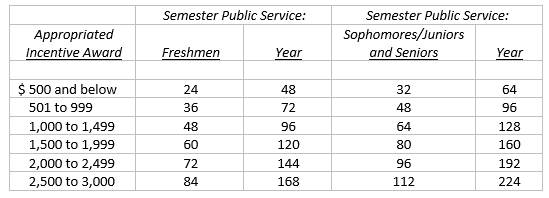The UNC
Policy Manual
800.1.4[G]
Adopted
12/10/98
Incentive Scholarship Program for Elizabeth City State University
Effective July 1, 1999. The
incentive scholarship program is intended to give needed aid to well-prepared,
in-state students who want to attend Elizabeth City State University on a
full-time basis. The cost for tuition, fees, room and
board, and books to attend ECSU will be calculated as the maximum financial aid
package. Special appropriated incentive
scholarship funds (maximum $3,800 per recipient per academic year) will be used
after all other need-based funds for which a student is also eligible have been
included in the student’s financial aid package. The awards are available to
entering first-time freshmen and entering first-time transfer students, and
will be renewable semester-by-semester as long as the
recipient meets all applicable criteria listed below:
1. To
be eligible for an incentive scholarship as an entering freshman, a student
must meet the following requirements:
a. be a graduate
of a high school in one of 21 identified counties in northeastern North
Carolina:
Beaufort Hyde
Bertie Martin
Camden Nash
Chowan Northampton
Currituck Pasquotank
Dare Perquimans
Edgecombe Tyrrell
Franklin Vance
Gates Warren
Halifax Washington
Hertford
b. rank in the top half of his or her class upon high school
graduation, and meet all other University admission requirements;
c. apply for need-based student financial aid. The total scholarship award under the program
shall carry a maximum value equal to the cost of tuition, fees, room and board,
and books. Incentive scholarship funds
will be used after all other need-based funds for which the student is also
eligible have been included in the student’s financial aid package. In the awarding of financial aid for the
program, the special appropriated funds for the incentive scholarship will not
exceed $3,800;
d. agree to
perform public service hours, at ECSU or in the community based on the
following special appropriated incentive scholarship award (excluding need-based
funds) schedule:

e. carry at least 15 semester hours each regular semester;
f. a student retains academic
eligibility by meeting an academic year grade point average or a cumulative
grade point average on the following scale:
·
by the end of the freshman
year: cumulative 2.00 or higher;
·
by the end of the sophomore year:
academic year 2.50 or higher or cumulative 2.50 or higher;
·
by the end of the junior
year: academic year 3.00 or higher or
cumulative 3.00 or higher;
·
by the end of the senior
year: academic year 3.00 or higher or
cumulative 3.00 or higher.
g. reflect in
personal and scholastic behavior high moral and ethical standards.
2. To be eligible for an incentive
scholarship, a transfer student must meet the following requirements:
a. be a resident of North Carolina and
possess the Associate of Arts (AA), the Associate of Science (AS), the
Associate of Fine Arts (AFA), or a certificate or degree in a program that
articulates directly with an academic degree program offered by ECSU from one
of the following North Carolina Community Colleges* and meet all university
admission requirements:
Beaufort County Community College (Washington)
College of the Albemarle (Elizabeth
City)
Edgecombe Community College (Tarboro)
Halifax Community College (Weldon)
Martin Community College (Williamston)
Nash Community College (Rocky
Mount)
Roanoke-Chowan Community College (Ahoskie)
Vance-Granville Community College (Henderson)
*Chowan is no
longer a community college
b. have a cumulative GPA of at least 2.50 if the student enters
with an associate degree, or a 2.00 if the student enters after completion of a
certificate program;
c. apply for need-based student financial aid. The total scholarship award under the program
shall carry a maximum value equal to the cost of tuition, fees, room and board,
and books. Incentive scholarship funds
will be used after all other need-based funds for which the student is also
eligible have been included in the student’s financial aid package. In the awarding of financial aid for the
program, the special appropriated funds for the incentive scholarship will not
exceed $3,800.
d. agree
to perform public service, at ECSU or in the community based on the special
appropriated incentive scholarship award (excluding need-based funds) which
appears above in Item 1.d.,
the schedule for public
service hours;
e. carry at least 15 semester hours each regular semester;
f. maintain a 3.00 cumulative grade point average at ECSU if the student enters with an
associate degree, or if the student enters from a certificate program, he or
she must have:
·
a 2.00 cumulative grade point average by the end of the
freshman year;
·
a 2.50 academic year grade point average or a 2.50
cumulative grade point average by the
end of the sophomore year;
·
a 3.00 academic year grade point average or a 3.00
cumulative grade point average by the
end of the junior year;
·
and a 3.00 academic year grade
point average or a 3.00 cumulative grade point average by the end of the senior
year and
g.
reflect in personal and scholastic
behavior high moral and ethical standards.
[This is a
rewrite of Administrative Memorandum #388.]